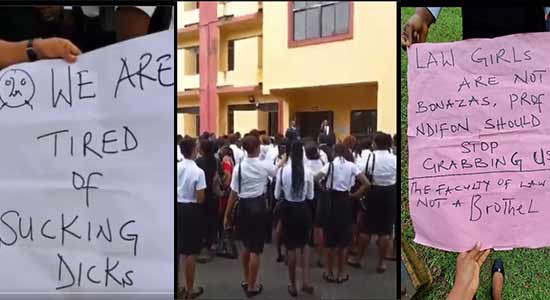As interested parties in the Sexual harassment accusations leveled against University of Calabar dean of Law Faculty, await the outcome the of case a former prosecutor, Nkereuwem Abraham, has stress the need to hold the lecturer accountable if there any evidence against him.
The dean of the Law Faculty, Cyril Ndifon, is currently under detention after he was arrested on October 4 by agents of the Department of State Services and the Independent Corrupt Practices and Other Related Offences (ICPC). He had shun several invitations by the ICPC to appear for questioning in their investigations of the accusations leveled against him by female Law Faculty students of the institution.
The ICPC subsequently, on November 2, preferred a 14-count charge against Mr Ndifon after investigations.
Mr Abraham, a former prosecutor with the Economic and Financial Crimes Commission (EFCC), said Thursday in an interview that if the security agencies established a prima facie case against the don, he should be prosecuted.
“Such a high profile matter deserves urgent attention,” the former prosecutor said.
Mr Abraham said a charge against a defendant, without consequent arraignment and trial, is not in line with constitutional provisions.
According to him, being a sensitive matter evolving from a citadel of learning, the prosecution must commence speedy arraignment of the suspect and trial.
“This is a high-profile professional and criminal act allegedly perpetrated by the defendant, and so, the case must be given the attention it deserves. I urge the ICPC to, as a matter of urgency, arraign the former dean of the faculty of law at the University of Calabar,” he said.
Mr Abraham noted that it was unlawful for any suspect to be kept in custody beyond reasonable time without arraignment in a court of competent jurisdiction.
“No suspect deserves to be kept in perpetuity because a charge has been filed against him without arraignment. Matters of this nature should ordinarily be given urgent attention to erase doubts as to the prosecutory prowess of anti-graft agencies,” Mr Abraham explained.
He added, “The sooner the trial of the defendant commences, the better and more commendable it is for the judiciary and the rule of law. I, therefore, call on the anti-graft agency to move speedily and ensure that the defendant is brought properly before the court, as this will repose public confidence in the system.” NAN
 UNICAL Female students protesting harassment by Ndifon
UNICAL Female students protesting harassment by Ndifon 
